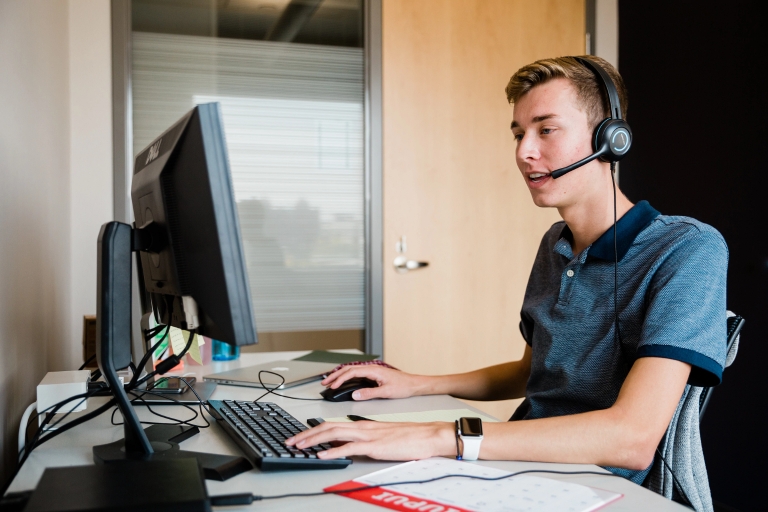Tucked away in quiet offices and workspaces in Bloomington and Indianapolis, linked only by technology and their shared mission, Indiana University’s contact tracers have been hard at work for months.

Responsible for isolating cases and identifying close contacts of people with COVID-19 to prevent the virus from spreading, they spend most of their days talking for hours into their phone headsets, working through an electronic queue of cases and questions.
“We don’t just work between the hours of 8 and 5; we’re working on weekends, on Sundays, on holidays,” contact tracer Julie Ranz said. “But it’s meaningful and purposeful, and almost everyone we talk to is committed to doing the right thing. It might not be fun or convenient for them, but it’s clear they know it’s important.”
What’s at stake? The health of Indiana University.
“Contact tracing is our last line of defense,” said Dr. Adrian Gardner, director of contact tracing and disease management for the IU Medical Response Team and director of the IU Center for Global Health. “These cases have already happened, and we’re here to prevent the infection from spreading.
“There are a lot of proximity tracking apps and high-tech electronic tools that have been developed to try to improve efficiency in this process, but one of the decisions we made early on was that we felt it was important to have human contact in a process that is augmented by technology. And that’s been a good decision.”
IU currently employs 36 contact tracers, and they are supported by IU’s call center, whose workers have all been trained in contact tracing as well. A few additional contact tracers working with the IU group are employed by Fairbanks School of Public Health at IUPUI to serve Marion County. The support of these groups allows for collaboration and flexibility during times of need, Gardner said.
IU’s contact tracers are from a diverse background – some are IU employees whose other positions were part of a Reduction In Force due to COVID-19, while others are undergraduate students or Ph.Ds.
All undergo a six-hour online contact tracing training series created by the Johns Hopkins Bloomberg School of Public Health, a three-hour training on IU’s database that manages all the information about cases and close contacts, and a one-hour training on the phone system. There’s a private Microsoft Teams group where the contact tracers can share tips about things they’ve learned on the job in an environment that protects the privacy of those who’ve tested positive.
Need more info?
“The common trend is that all of our people are passionate about wanting to do something during this pandemic,” said Theresa Vernon, one of IU’s two program managers for contact tracing. “Not everybody can put on a white coat and stethoscope and go into the ER to treat sick people. But these are people with a passion and a desire to help in these unprecedented times, who want to make a difference in helping keep their community safe.”
That includes IU Bloomington alum Benjamin Higgins, who graduated in May with majors in biology and philosophy.
“What drew me to this job was my background in public health and disease biology, but also the desire to feel like I can contribute to this fight that’s so widely relatable across our nation and world, and help stop the spread of COVID-19,” he said.
Ranz, an alum whose daughter is a freshman at IU Bloomington this year, also wanted her work to count. Having previously worked in donor relations, she instinctively understood what goes into building a relationship with the voice on the other end of the line. Plus, she said, she knows just how important contact tracing is.
“That’s how smallpox was eradicated in this country: by contact tracing,” she said. “People need to know that this works, that we’re doing this to keep them safe.”

